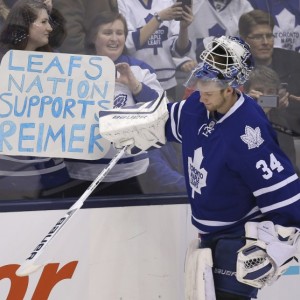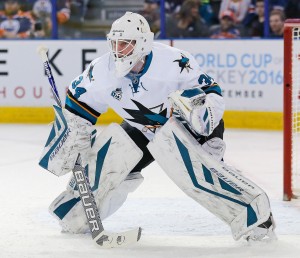Thursday’s 6-3 loss against the Edmonton Oilers marked goaltender James Reimer‘s fifth start for the San Jose Sharks. Since Reimer’s debut back on Mar. 5, the Sharks have played 11 games in total. The other six were started by Martin Jones. That’s as even of a split as possible between the two goaltenders.
Now granted, two of Reimer’s starts have come in back-to-back situations and the overall idea has been to make sure Jones is fresh come the playoffs. After all, this is the 25-year old’s first season as a starter in the NHL. Furthermore, if you include the 27-year old Reimer’s first game dressed as the backup on Mar. 3, Jones has started 7 games since Reimer was officially game ready (after all those silly visa issues). Therefore, Jones has still been getting the slight advantage in terms of crease time.
However, Thursday’s start for Reimer was not nearly as predictable as his previous four. In his first start the Sharks were eager to get him into the lineup to both keep his game fresh and give Jones a much needed breather. Jones had started 18 of the previous 19 games. As mentioned above, two of Reimer’s other three starts have come via back-to-back situations where most teams in the league play their backup in one of those games. Reimer’s only other start prior to Thursday came Mar. 15 against the Boston Bruins, a team whom he has had tremendous success against over his career. Combining that history with the fact Jones had played two straight against Washington and New Jersey, it was an easy call for Head Coach Peter DeBoer to start Reimer against the Bruins.

Reimer Getting More Ice Time?
Thursday’s Reimer start was the first for No. 34 where No. 31 would have made sense as the starter. Jones played extremely well against St. Louis on Tuesday and he had the night off in San Jose’s previous game on Sunday. In other words, prior to Thursday, Jones had played just once in the last four days. He certainly was fresh enough to have started against the Oilers. DeBoer instead elected to go with Reimer and you really can’t blame him for that decision.
While Jones has been terrific lately with a .943 save percentage in his last six starts, Reimer came into Thursday slightly better in his first four starts as a Shark, a save percentage of .952. Not to mention, three of the five goals Reimer allowed over that span were on the penalty kill. Take away Vancouver’s three goals and 12 shots on the power play that night and Reimer had otherwise stopped 90 of his first 92 shots against for a .978 save percentage.
Both Sharks goalies have been out of this world awesome here in the month of March and as yours truly wrote last week, both should start games come the playoffs. A true playoff tandem between two goalies is quite rare in the NHL. In fact, it is hard to recall when exactly we saw the last tandem of two strong goaltenders on the same team in the playoffs. Journeymen Michael Leighton and Brian Boucher split time 50-50 for the Eastern Conference champion Philadelphia Flyers in 2010, but that was a tandem due mostly in part because both goalies were No. 2 quality. Neither were capable of being No. 1 goaltenders.
Playoff Tandems?
So when was the last tandem? This pundit has asked various fans on social media and looked through the numbers and it is still difficult to pin point when exactly there was a strong tandem utilized. Somewhat recently, a Sharks fan on Facebook noted that the Vancouver Canucks split time with Cory Schneider and Roberto Luongo in the 2013 playoffs. However, in that four game sweep at the hands of the Sharks, Luongo actually started Games 1 and 2 while Schneider started 3 and 4. It wasn’t really a true rotation. Luongo played well in the first two games and likely would have started Game 3 if the series had been 1-1 or 2-0 in Vancouver’s favor. Schneider had overtaken Luongo that season for the No. 1 job, but Schneider was coming off an injury. The change to go to back to Schneider was an unnecessary desperation move by then head coach Alain Vigneault as the Canucks had to play games three and four in San Jose after dropping the first two at home. This wasn’t a true tandem.

In recent years, some teams have used both goaltenders as starters. Last year’s Cup winning Blackhawks had Scott Darling play in the first round for a few games when Corey Crawford struggled early on. Eventually Crawford found his game and became the every night starter again, leading Chicago to their third Stanley Cup in six years. Chris Osgood led the Detroit Red Wings to a Stanley Cup in 2008 after taking over mid-playoffs for Dominek Hasek, but again, this wasn’t a tandem. Two years ago the Anaheim Ducks started three different goalies over two playoff series. However the split was seven, four and two games each. Also not a tandem. At the moment, I still haven’t figured out when the last true tandem was utilized in the playoffs outside of the those two bad Flyers goalies in 2010.
Could Reimer Actually Re-Sign in San Jose?
The Sharks are in an interesting spot with two goaltenders playing at a phenomenal level. Jones is under contract for two more seasons at a very reasonable cap hit and has backstopped the Sharks for the vast majority of their games this season. As my colleague Zeke recently wrote, there is a goaltending dilemma of sorts right now in San Jose. In the piece, Zeke astutely points out that while Reimer likely leaves as a free agent after the season, they could sign him and then trade Jones. This makes a lot of sense when it comes to the Sharks maximizing asset value. The Sharks would likely have to offer Reimer $5 million per year, which is $2 million more than Jones but in doing so, they don’t end up losing Reimer for nothing as a free agent and can instead trade Jones for what would likely be a really strong return. Jones has proven himself this season that he can be a top-15 goaltender in the league with top-10 potential. There is a strong case to be made that keeping Reimer at a slightly higher cap hit and acquiring a highly regarded NHL ready prospect for Jones, is better value than keeping Jones and letting Reimer walk free.
Reimer’s Numbers Actually Significantly Better Than Jones?
Overall this season Jones has been a clear cut upgrade over the departed Antti Niemi. For the season Jones has a .920 save percentage, an above average mark, ranking him tied 14th in the NHL out of 36 goalies who have started 30 or more games (save percentages are through games completed prior to Mar. 24). Reimer on the other hand was tied for six spots higher, 9th in the league with a .922 overall save percentage before Thursday’s loss to the Oilers. Now, you may be thinking .002 is not much of a difference because well, it’s not. However, the difference in even strength save percentage is a significantly bigger gap in Reimer’s favor.

According to War-on-ice, Reimer is second in the league among goalies with over 1400 minutes played in even strength save percentage at .942. Jones is ranked 19th in this category at .926. While .002 is certainly not very significant, .016 is rather noteworthy. Not to mention, many in the analytics world will argue that even strength save percentage is a much stronger indicator of a goaltender’s ability than overall save percentage.
Furthermore, when it comes to high-danger save percentage, Reimer remains second in the league behind only Brian Elliott. Reimer and Elliott have both been significantly better at making high-danger saves than the rest of the league. Goalies ranked third through 10 are all extremely close in their percentages, whereas Reimer and Elliott are far clearer north of third ranked Jonathan Quick than say Quick is above fourth place Crawford and Crawford is over fifth place Schneider.
Fantastic Dilemma
Zeke is correct, the Sharks have a goaltending dilemma, but it is a fantastic dilemma to have. Both Jones and Reimer are capable of leading this team to the Stanley Cup. Jones has certainly earned a shot at proving he can be a difference maker come the playoffs based on how well he has played this season and on a heavy workload. However, Reimer also deserves a shot to prove he can do the same thing. Plus when it comes down to performance, it makes little sense to keep the better goalie statistically (Reimer) on the bench come the postseason. DeBoer and the Sharks would be wise to keep this 50-50 split, every other game rotation going come playoff time. It’s working down the stretch of the regular season, there is no reason it can’t work during the postseason.